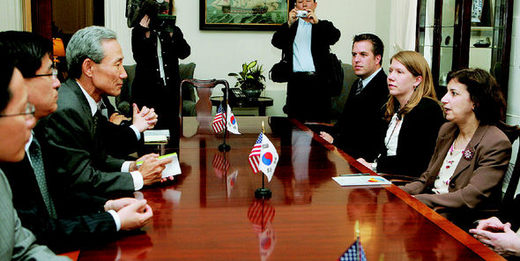 |
|
South Korean chief negotiator Kim Jong-hoon,third from left, and US counterpart Wendy Cutler, far right, kicked off talks on FTA in Washington, D.C. Washington/AP Yonhap
|
Kaesong products, rice among areas of contention
South Korean and U.S. officials agreed this week to clarify which areas need to be mulled over in order to successfully sign a free trade agreement (FTA), but things could hit a snag as the two sides are expected to hold their ground on a number of thorny issues.
In Washington, about 300 delegates from the two nations, headed by South Korea’s FTA Ambassador Kim Jong-hoon and Assistant U.S. Trade Representative Wendy Cutler, started their first official negotiations on free trade, which will last for five days.
"Given our discussions on 11 areas out of 17 during today’s first negotiation, I believe that chances are high that we will be able to produce a list of [the most critical issues] by the end of the formal talks," Mr. Kim told reporters in a press briefing. "We came to an agreement on about 30 percent of items in each subcategory, which is better than expected," Mr. Kim said, adding that it would take only one or two days to finalize the agenda.
However, Mr. Kim said that both countries have yet to find common ground in areas such as the agricultural, textile, and pharmaceutical sectors. South Korea and the U.S. hope to wrap up the negotiations by the end of next March, before U.S. President George W. Bush’s power to sign trade deals without being subject to congressional approval expires on July 1, 2007. At the talks, Seoul made some key concessions to Washington, including halving the quota on the ratio of domestic movies to imported fare required to be released in South Korean theaters, and allowing the resumption of imports of U.S. beef after a ban due to mad cow disease outbreaks there. The talks have caused an outcry from the South Korean agricultural sector, which worries that cheap rice and other produce from the U.S. could wreak havoc on their livelihood. Emerging from the first talks with South Korean negotiators, Ms. Cutler cited rice, beef, and automotive products as the most contentious areas. Another major hurdle will be the issue surrounding products from the joint Korean Kaesong industrial complex, housed in North Korea. Seoul wants the U.S. to accept goods made there as South Korean products. During the first official talks, Mr. Kim reportedly urged the U.S. to include the products from Kaesong as part of South Korean production, saying that the Kaesong industrial complex will play an important role in reviving the North’s economy and contribute to the stability on the Korean Peninsula. However, Ms. Cutler evaded the request by saying an FTA is just between the U.S. and South Korea, sources close to the negotiation said. For the duration of the talks, about 50 South Korean protestors staged demonstrations in Washington before marching to the White House, and held candlelight vigils, as well. South Korea and the U.S. are expected to start a second round of negotiations July 10-14 in Seoul, with further talks scheduled to be held in September, October, and December.





